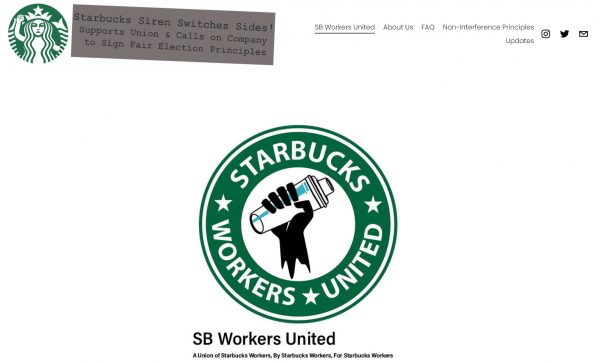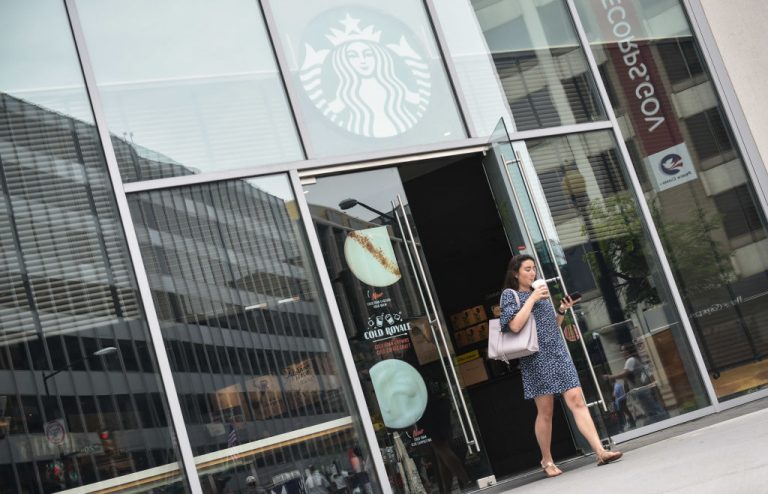An organizer group heavily involved in the push to convert Starbucks franchises to unionized workplaces has accused the cafe giant of a slew of workers’ rights violations in formal complaints to the U.S. National Labor Relations Board (NLRB).
Workers United filed complaints with the Buffalo office of the NLRB, claiming the chain organized “effectively mandatory” anti-union meetings that barred pro-union staff from attending, according to March 1 reporting by Bloomberg.
RELATED READING:
- Public Employee Union-led Counter Protest Against Freedom Convoy Flies Hammer and Sickle Flag
- Unions Lauded Lockdowns While Raking Tens of Millions in Ineligible COVID Relief Funds: Report
- California Supply Chain Crisis Could Be Rooted in Union Labor Dispute
Bloomberg stated that the organization, which also accused Starbucks of selective enforcement of language, dress code, and COVID-19 quarantine policy on pro- and anti-union workers, is pushing for as many as 100 franchises to unionize.
One of the twenty complaints filed against the chain also alleged Starbucks terminated the union leader at the first store to become unionized in Buffalo in December of 2021.
Success
You are now signed up for our newsletter
Success
Check your email to complete sign up
A Starbucks spokesperson denied the allegations in an email to Bloomberg, “We’ve been clear from the beginning: Any claims of anti-union activity are categorically false.”
Bloomberg also noted, “Previous complaints filed by the union are still pending with the agency, including one over the firing of seven employees at a Memphis store — a group that included almost all of the union’s organizing committee at the location.”
According to the outlet, the company said it terminated the staff because of safety violations.
Raising fists
The website for Starbucks Workers United, which lists its head offices in Buffalo, features a modified version of the company’s signature siren logo, but with its right fist raised in the same manner that adherents of the Communist Party use to signify loyalty and the embrace of “revolution.”

In April of 2021, Murray Bessette, speaking on behalf of the Victims of Communism Memorial Foundation, told Fox News unequivocally, “It is a symbol used by movements that establish oppressive systems, as every system established along Marxist lines has been.”
“The raised fist is primarily used by organizations and movements that are heavily influenced by Marxism broadly understood…The common thread is [an] understanding of all social, economic and political relations as a contestation for power between a class of oppressors (i.a., rich, White, heterosexual, male) and a class of oppressed,” Bessette stated.
Starbucks Workers United claims on its About Us page that, “We are not anti-Starbucks. We are Starbucks!…We want to be able to be our best selves, and we cannot reach our full potential if we are understaffed, overextended, exhausted, and burned-out.”
The group further states it aims to “improve” the company, “transform” the industry, and “form a collaborative, creative, forward-thinking, justice seeking, independent organization that will allow us to advocate for ourselves.”
Red echoes
The Starbucks unionization initiative has been praised and rebroadcast in multiple socialist publications, including Mundo Obrero Workers World and Marxist.ca.
In a Feb. 11 article published on Marxist.ca, which directly took issue with the chain’s alleged union-busting practices, stated, “Starbucks has engaged in typical union-busting behaviors since the first rumblings of organizing. This is not surprising considering that the original Starbucks union in Seattle was broken in the late 1980s.”
“Before the December 2021 unionization vote, Buffalo was flooded with managers, corporate executives, and anti-union consultants to fight the effort and divide the workers. Schultz himself even gave a bizarre presentation to workers in a meeting where he compared the shared struggles of Starbucks employees to prisoners in the Holocaust.”
The initiative is not restricted to the United States. A Feb. 26 article by the far-left Jacobin Magazine lauded a single Starbucks outlet located in the Chinook Center Mall in Calgary, Alberta for attempting to unionize under the banner of the United Steelworkers’ union.
That location’s ballots to decide if it will unionize are due March 9.
A curious Rhodes Scholar
In Feb. 13 reporting by the establishment-left Washington Post, the publication elucidated the methods and motives utilized as young employees of the iconic coffee franchise are employed to convert the company into a unionized environment.
The article promoted 24-year-old Jaz Brisack, a recipient of a Rhodes Scholarship, who “raced unhappily through her Rhodes in a year – instead of the normal two – and returned to Buffalo, where she landed the Starbucks job.”
The website for the Rhodes Trust describes the honor as “the oldest (first awarded in 1902) and perhaps most prestigious international scholarship programme, enabling outstanding young people from around the world to study at the University of Oxford.”
The award is financially significant, “The Rhodes Scholarship covers Oxford University (and College) fees as well as providing an annual stipend. For the 2021/22 academic year, the stipend will be £17,310 per annum (£1,442.50 per month) from which Scholars pay all living expenses, including accommodation,” states the website.
According to website Glassdoor, the starting pay for a barista at a Starbucks in Buffalo is $14 per hour, and on a part time basis.
Inorganic organization
Washington Post says that in January of 2021, Brisack spent the next eight months learning how to “froth lattes and blend Frappuccinos,” passing the time as she worked judiciously, getting out of bed “before sunrise to help open her store and picked up shifts at other Buffalo Starbucks where she met other baristas who told her about their lives, frustrations and concerns with the company.”
The article lauded her “inspiration” to push for unionization as a “a speech delivered by the legendary American socialist Eugene Debs,” which she ingested during her time as a homeschooled teenager in Tennessee.
By July of 2021, Washington Post stated that Brisack “felt she had proved herself a reliable worker” and wanted to take advantage of the labor shortages impacting the United States.
She then invited a 25-year-old female coworker to a private rendezvous under the pretext of learning to crochet.
After the meeting began and some alcohol was served, Brisack revealed the real purpose of the chat was to initiate a unionization movement, relying on “the need for better pay, more generous benefits, more consistent scheduling and a fairer promotion system” as a pretext.
Recounting the tale, the Post continued, “In the days that followed, Brisack began contacting other baristas at her store and the 19 other Buffalo Starbucks.”
“Secrecy was paramount…Brisack focused her initial search on baristas who had championed liberal causes on a group chat that Starbucks’s Buffalo employees used to promote events or find fill-ins when they couldn’t work their normal shifts.”
The author elaborated on the fruits of Brisack’s exploits, “Most of the people with whom she met were in their mid-20s; many were the first in their families to attend college and were saddled with five- and six-figure student loan debts. Some had parents who had struggled with addiction or had served time in prison.”
The recruitments were introduced to a man named Richard Bensinger, described as “a lead organizer on the Nissan campaign,” who invited Brisack to Buffalo because “he was working on several campaigns, including one to organize a small, locally owned coffee chain.”
According to the heavily left-wing Wikipedia, Bensinger was a career union man in the 1990s, serving as the “first person to hold the position of National Organizing Director for the AFL-CIO [American Federation of Labor and Congress of Industrial Organizations ].”
Bensinger was terminated in 1998 for being ineffective, but went on to be recruited more than a decade later in 2010 by the United Auto Workers union “to organize Japanese, Korean, and German transplant factories in the United States as part of the UAW’s work to increase membership.”
“Bensinger continues to be paid for consulting work by the UAW, as well as Workers United in Rochester, NY and the United Brotherhood of Carpenters, among others,” states the entry.
















